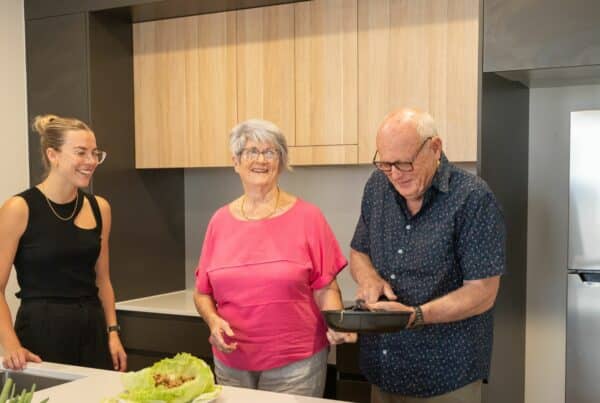How to Help Your Elderly Loved One With Meals
Eating well and living a healthy lifestyle is important at any stage of life. As people get older their lives are often consumed by medical appointments, managing health conditions, and managing physical changes. Consequently, something as crucial as a healthy diet can be overlooked, especially if they’re only cooking for one. Many of us are unaware of the extent to which this impacts on the elderly, who are often in need of assistance to meet their nutritional requirements. With this in mind, there are some simple steps that you can take to help your loved one to improve their diet and lifestyle.
Health Reasons Impacting on Changes to Diet in the Elderly
Malnutrition is not a normal part of ageing. There could be an untreated, underlying health condition that needs to be addressed.
Many people lose weight as they get older because they have difficulty chewing or swallowing. This could be for various reasons, including toothaches or ill-fitting dentures. Talking with your elderly family member about this and having a check-up with the dentist and speech pathologist will allow for problems to be detected.
Some older people have changes in their diet due to pain and limited mobility. They might find it hard to manage physically at mealtimes, and might not be able to move around the kitchen quick enough when cooking. If you’re worried about your elderly loved one, have a meal with them to see if there are any obvious signs of restricted mobility as they prepare and eat their meals. If you notice anything, consider a trip to the G.P. and an assessment with an Occupational Therapist to determine interventions to assist.
Other older people can experience memory problems and forget to eat. If you’ve noticed that your loved one is becoming forgetful or confused, it’s a good idea to go to the doctor and discuss support options for your family member. They might be able to continue managing at home with some additional support, or it could be time to consider moving into an aged care facility where they’ll receive 24-hour support if needed.
If your elderly family member is obviously losing weight for no particular reason, consider keeping a diary to track their dietary intake and weight loss. They should also see their doctor. The doctor can do an assessment and ascertain the support and additional assessments that they require. They could need a review by a dietitian and possibly a geriatrician to determine a plan of care moving forward.
Difficulty Managing in the Kitchen
Many older people experience physical changes that impact on their ability to manage in the kitchen, limiting what they’re able to prepare and cook. This is one of the reasons that seniors enter aged care facilities in Australia.
Entering an aged care facility under these circumstances could be a result of safety issues in the kitchen whereby preparing meals becomes a danger to the person. Others who struggle to prepare and eat meals often experience unhealthy eating habits as a consequence. But there are options to help your loved one to manage around the kitchen. If your loved one is experiencing difficulties, consider helping them with meal preparation and offer to cut up their meals if they need it. Otherwise, you could look into arranging some help for them if you’re unable to get to assist on a regular basis.
Dealing With Social Issues That Impact on Eating as You Age
While some factors that impact on eating are obvious, some are not so obvious. Some older people have very limited funds and have issues with affording food. If your family member is struggling financially and this is impacting on their diet, there is help available. There are food relief programs offered through charitable organisations that can help them. If your loved one needs food and is unable to pay for it, contact Food Bank in your state.
Other older Australians have difficulty getting their groceries. This could be a result of limited mobility or lack of available transport. Fortunately, there are government-funded aged care services that can provide transport and grocery assistance when required.
The socially isolated elderly might feel that there’s no hope or help available in these circumstances. However, by contacting My Aged Care you could be eligible to receive a government-funded package of care to help meet your needs.
Help and Support For Your Elderly Loved One at Meal Times
If you’re unable to support your loved one at mealtimes, consider contacting My Aged Care to arrange an assessment with the Aged Care Assessment Team (ACAT). My Aged Care is the point of entry for government-funded aged care support services in Australia. With an ACAT, your loved one might be eligible for some assistance at home. This is called a Home Care Package. Depending on how much funding they receive, they may be able to arrange some carer support to help with shopping, transport, meal preparation and assistance with eating.
You could also talk with your loved one to see if you can arrange an appointment with their doctor together. There you can discuss concerns surrounding diet and nutrition. Your doctor might be able to arrange a management plan so that your loved one can receive allied health services, covered by Medicare. An assessment can be done by allied health professionals to assess meal preparation and provide interventions that would be necessary to assist and improve outcomes.
Finally, if you think that your family member is experiencing difficulties with their diet, there is help and support available for them. For further information, contact your Fuel Your Life Dietitian on 0401 302 872.
Author: Renae Diggles/ Registered Nurse, Case Manager & Editorial Director / Retirement Now
Read our article “Nutrition for Healthy Aging” on Retirement Now HERE.




![Helping a Senior Loved One With Their Diet [Guest Writer – Renae Diggles]](https://fuelyourlife.com.au/wp-content/uploads/2020/12/senior-loved-one.jpg)


